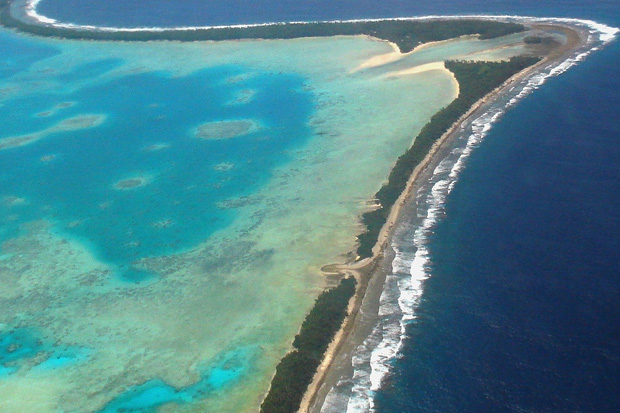Not a pretty picture: the climate-change threat faced by a small island nation
Ambassador from Tuvalu to speak on panel about art and climate change
 Photo/WikiMedia
Photo/WikiMediaThe beach of a Tuvalu atoll.
Aunese Makoi Simati, Tuvalu’s ambassador to both the United States and the United Nations, estimates the nine islands and atolls that comprise the South Pacific nation are about a quarter of the size of Manhattan, where he lives while doing his diplomatic work. And as sea levels rise, the nation’s 10,000 citizens stand to be the first humans to lose their country (average altitude 2 to 3 meters above sea level) to climate change.
Simati is speaking about his country’s plight at Brandeis on Friday, March 24 as part of “Art and Environmental Crisis,” a panel hosted by Aida Yuen Wong, Nathan Cummings and Robert B. and Beatrice C. Mayer Chair of Fine Arts. Peter R. Kalb, the Cynthia L. and Theodore S. Berenson Associate Professor of Contemporary Art, will moderate, and Mark Cheetham, professor of art and an eco-art historian at the University of Toronto, will join Simati and Wong on the panel to discuss the role art can play in promoting climate activism.
“Throughout history, we see that artists brought marginalized ideas and people to the forefront,” Wong said. “Today, artists have an important role to play in focusing attention on climate change and its impact on people and places that may be far from the traditional centers of the art world.”
There are no climate-change deniers on Tuvalu: Simati said the effects are already apparent.
“People are losing land because the sea water is flooding in and the coastal trees are falling,” he said. “What is even more problematic for us is the sea water is coming up from the corals [on which much of the islands sit], it salinates our water holes where we get well water. It also kills our food crops because crops don’t drink salt water.”
Simati said a far larger share of the island’s food must be imported now. Where those who lived outside the capital could once live mostly off fishing and the fruit and vegetables that grew indigenously, now nearly everyone supplements heavily with imported rice.
New Zealand allows 70 Tuvaluans to emigrate each year. Simati said it used to be that quota wasn’t reached; now, as life becomes more challenging in Tuvalu, relatives who have emigrated are helping family back on the island make the move.
For the past semester, Wong has been conducting an experiential learning course called “Tuvalu to the World,” where art history, environmental studies, and computer science students collaborate to build a website about the crisis of Tuvalu. They will also create an exhibition on campus during the Festival of the Arts in April to highlight the relationship between climate change and global food security.
“This course has enabled students to use their skills in promoting art and activism around climate change,” Wong said.
Simati says part of his mission as an ambassador from a country under existential threat from climate change is to engage students in thinking creatively about solutions.
“At universities, there is always another cohort of researchers who can do a little bit more than what previous researchers have done,” he said, “I tell young people ‘you have a very vital role in helping us tell the stories from where the environment is changing. The future is yours: you are students now, but leaders tomorrow.’”
Categories: Arts, General, Science and Technology, Student Life





